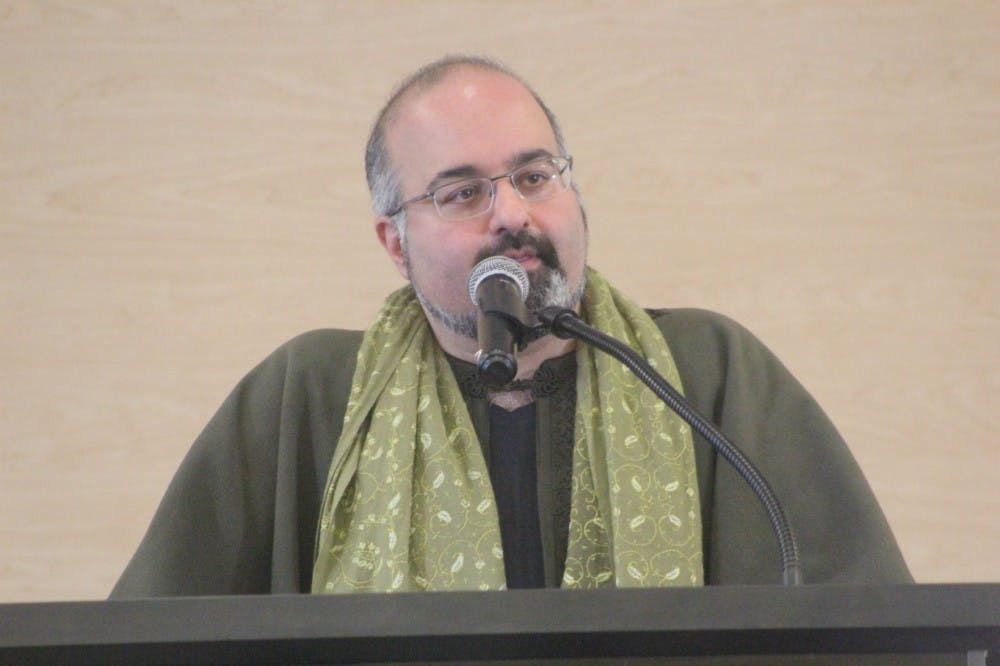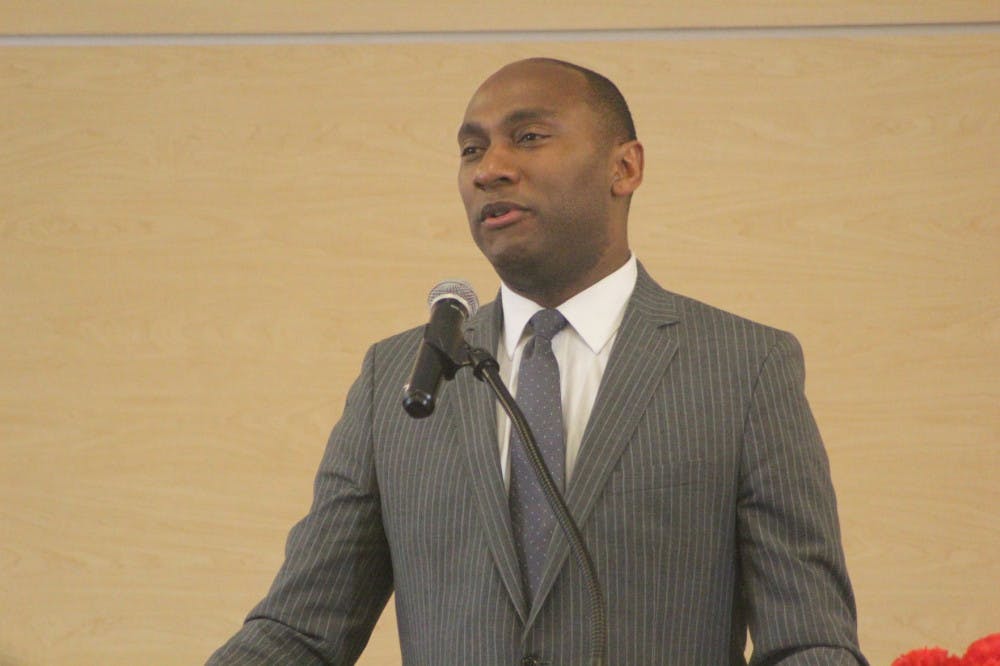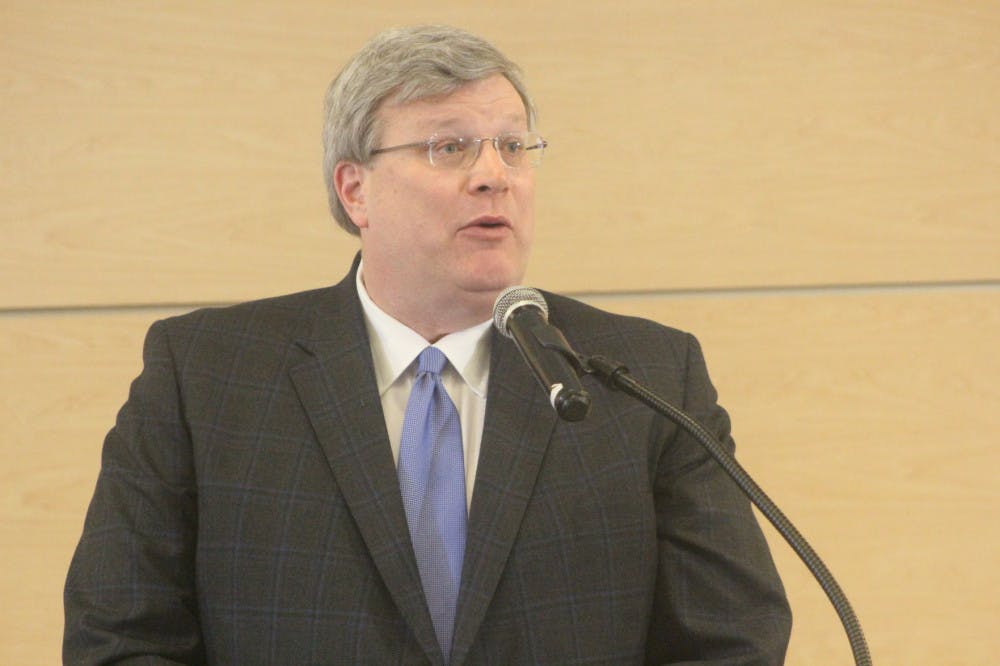
Duke University’s Omid Safi adressed injustice in the United States and throughout the world at Martin Luther King Jr.s’s 51st Commemoration.
Local and national Civil Rights Movement leaders gathered alongside citizens for the 51st commemoration program for Martin Luther King Jr. at the National Civil Right Museum on April 4. Notable guests like some of King’s closest associates, including Rev. James Lawson, Rev. Jesse Jackson and the keynote speaker, director of Islamic Studies Center at Duke University Omid Safi. The event featured musical selections from the LeMoyne-Owen College Concert Choir.  Â
The day’s foggy skies somewhat embodied the turmoil that occurred 51 years ago when King was assassinated by James Earl Ray. National Civil Rights Museum president Terri Lee Freeman began the commemoration by focusing on points of King’s unfinished work. Freeman stressed the importance of equity, diversity, and inclusion. Freeman said we must continue the fight for life, liberty and the pursuit of happiness.
“If we believe those words and principles to be true then, we have more clarity and understanding on why Dr. King pursued fair housing for African-Americans, free from discrimination,†Freeman said. “We understand why the passage of the 1964 Civil Rights Act was so important, as well as the Voting Rights Act of 1965.â€
Freeman lastly challenged the crowd to work with the same efforts of King, using the same efforts to uplift the current state of impoverishment and injustice from systematic oppression. Freeman would introduce King’s close associates Lawson and Jackson so they could speak about their reflections of his legacy. Â
“A man, a friend, who through the Montgomery Bus Boycott committed himself totally to the purpose of history,†Lawson said.
Lawson said he remembers being gassed in early February 1968 while he and others peacefully marched to the Mason Temple to develop strategies for the 1,300 sanitation workers who went on strike. With the media defining the peaceful strike and protest as a public disturbance, Lawson stood tall as the head of the meetings for the strike.
Ultimately, he decided on seeking help outside the state from civil rights leaders Bayard Rustin, Roy Wilkins and King himself. The sanitation strategists arranged for each man to come in the listed chronological order. King was chosen last to not deter the others from coming, Lawson said.Â
“We know now that the politics of assassinations of the 1960s were deliberate, and that Kings assassination was one of those,†Lawson said. “That, it in many ways, helped to make the present moment of chaos in the United States possible. We also know that the way out of it is by essentially organizing campaign after campaign after campaign that chips away at the crudity of our land and allows people to become more human and more alive.â€Â
Rev. Karren Todd would take the podium after Lawson and deliver excerpts from the Bible, as well as the parable of the good Samaritan. Next, Nabil Bayakly would deliver words from the Quran and connect it with King’s teachings.Â
Afterwards, Jackson gave his reflection on Dr. King after an introduction from Freeman. Jackson recollected King’s struggle to find a way to uplift people from the pits of poverty. He cited how King, him, and other leaders saw redirecting their focus on the sanitation workers in Memphis as a way of uplifting the epitome of poverty in the Mississippi Delta and around the United States.
He touched upon how King and the leaders planned to focus their efforts primarily on the Poor People’s Campaign and Vietnam War after visiting Memphis. Jackson mentioned a conversation he had with King before Memphis in which King said, “Maybe I should just quit, maybe I’ve done as much as I can do. We’ve done so much in such a short period of time… but then I couldn’t quit because if I turned back Harriet Tubman and Fredrick Douglass would not understand.†Â
In closing, Jackson referenced how black people have always overcome times of oppression, like times of slavery, confusion on emancipation of proclamation, lynching, Jim Crow laws and now with President Donald Trump’s administration. Jackson said overcoming these times are proven by things like Congresswomen Maxine Waters and Eddie Bernice Johnson being elected to the House of Representatives. He said people are still in a fight for equality in all social institutions but have created a new identity for the South.
“We get up because the ground is no place for champions, so champions keep fighting,†Jackson said.

Mayor Lee Harris

Mayor Jim Strickland
Following Jackson and more musical selections from the LeMoyne Choir, people from the community spoke. The community was represented by Memphis Mayor Jim Strickland and Shelby County Mayor Lee Harris who gave their insight on King’s importance and what’s needed today to continue his work. Safi spoke after an introduction from Freeman.
“I’m going to start by asking us to walk with Martin because we cannot go where we want to go if we don’t know where we come from,†Safi said. “I’m going to ask us to redeem and resurrect Martin. Not from that iconic, alone, and aloof figure that rises above the crowd but as a man of the people, as one who loved by the people and gave his life for the folk. To remember we’re all in this together.â€Â
Safi called for attention to be addressed on how King would recognize Trump’s administration and outlook on minorities. He touched upon King’s shunning by major publications and the FBI’s perceived image of his leadership. Safi challenged people to honor their love of King with the disputing of systematic injustices. Throughout his speech, he touched on issues like immigration, Ferguson, white supremacy, misogyny and world religions and closed with ideas about redeveloping the U.S.
Concluding the keynote address, Congressmen Steve Cohen and James Clyburn gave their insight on King’s legacy. After the congressmen spoke, footage of King’s last speech, “I’ve Been to the Mountaintop,†was played. Finishing the commemoration, there was a moment of silence and then a new wreath was placed outside King’s room in the Lorraine Motel.
Footage of the event can been viewed on the National Civil Rights Museum’s Facebook page.Â






